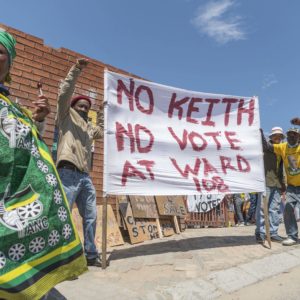Joburg’s uncertain political future
South Africa’s biggest city appears to be headed the way of a compromised coalition of the centre, or a grim right-wing bloc.
Author:
17 November 2021

Earlier this week, the right wing of South Africa’s political spectrum gathered for coalition negotiations in Johannesburg’s northern suburbs. The biggest prize being discussed by parties like the DA, the Freedom Front Plus and Action SA was Johannesburg itself.
Devastated by the pandemic, it was a city ill at ease as it took to the polls on 1 November. Data from the Gauteng City Region Observatory show that the proportion of people living below the poverty line in Gauteng had been steadily declining for the better part of the last decade. Over the last year, however, it increased dramatically to 36% of respondents in the institute’s Quality of Life Survey. Adult hunger also increased, amid crumbling public services, with one in four households reporting adults having missed a meal in the last year.
Emerging from the political debris is a grim new trust in an emerging and reactionary vision for Johannesburg, characterised by the unprecedented showing of Action SA, which, in taking 16% of the vote, roundly beat the EFF out of third place in the city’s political pecking order.
Related article:
In these elections, the same privileged northern suburbs where those parties have been negotiating the future of South Africa’s biggest city were not shy to veer further right than their already entrenched conservatism. In 2016, the DA won 83% of Sandton’s votes. This time around, the party’s share of the vote shrunk to 65% in the wake of an overwhelming turn towards ActionSA, which won one in every five votes cast.
But support for the new party was not limited to the city’s affluent areas. It also performed strongly in many townships and won 20% of votes in the inner city, where its leader, Herman Mashaba, oversaw a series of xenophobic and unconstitutional raids during his tenure as Johannesburg mayor.
The coalition to come
No stranger to the violent policing of Johannesburg’s inner city, having overseen the unlawful eviction of around 8 000 street traders there in late 2013, the ANC has cottoned on to the political success of Mashaba’s incendiary approach. Joburg’s strongest party sees downtown as a central pillar to stopping its heavy political bleeding and regaining support in the city. One senior official, who called downtown Joburg a “crime den” and a “huge problem for all of us”, said that, should the ANC govern in Johannesburg again, “we will camp downtown and bring the police”.
While some in the ANC consider a coalition of the right “a serious threat”, and despite Action SA’s huge success, right-leaning parties do not have the number of votes required to form a government in Johannesburg between them. Any coalition of the right would likely need the EFF’s 10% share of the vote, which is difficult to imagine considering the maximalist approach taken by the party in the wake of the elections, in which it has only been willing to trade outright control of councils.
So, despite having the increasingly rural character of its support confirmed – it only won 20% and 36% in the Western Cape and Gauteng respectively – and being left out of the negotiations in Sandton this week, the ANC may yet play a decisive role in Johannesburg’s new coalition.
Related article:
The ruling party shares many policy positions with the EFF in the city, even if it tends to adopt more incremental approaches. ANC policy favours the upgrading and development of vacant land, for instance, where the EFF has called for its occupation. Despite the apparent policy coherence, however, senior ANC figures in the city fear inadvertently allowing the EFF a chance to further grow in ANC constituencies. As a result, they did not support a partnership with the red berets, even before talks between the two parties were terminated this week.
While the DA has publicly ruled out allying with the ruling party, senior figures in the ANC in Johannesburg are holding out for a coalition of the centre. There is not much overlap between the two constituencies, which makes them sure that the “city can be managed in a way that is mutually beneficial” to both parties.
The ANC in Johannesburg, once a party of high policy ambition, if not practice, will be focusing on “getting the basics right” should it return to power. The vision of undoing apartheid’s spatial legacies through mass public transit and corridors of freedom will give way to prioritising basic municipal services, fixing potholes and street lights and delivering electricity to Soweto.
Senior figures in the party appear to believe that securing DA support will be fairly straightforward. If the ANC is able to keep the suburbs happy and maintained – cut the grass, fill the potholes, and ensure a good standard of infrastructure at parks, libraries and community halls – it feels certain it can establish a two-party coalition at the centre of Johannesburg’s increasingly uncertain politics.


